- CMSD Media Center
- Latest
Return to Headlines
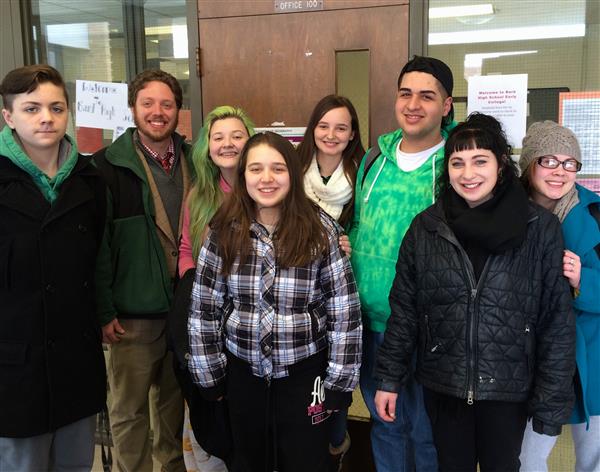
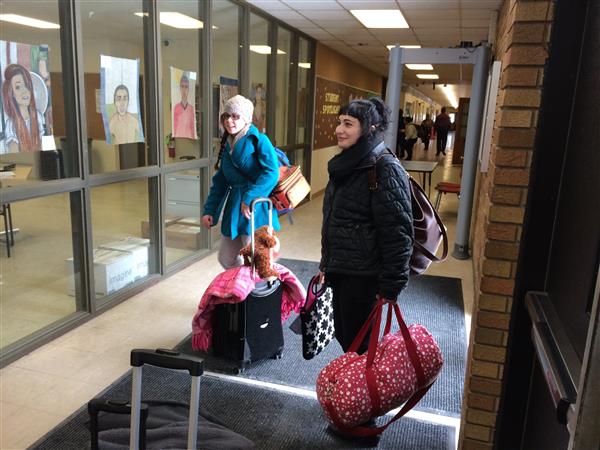
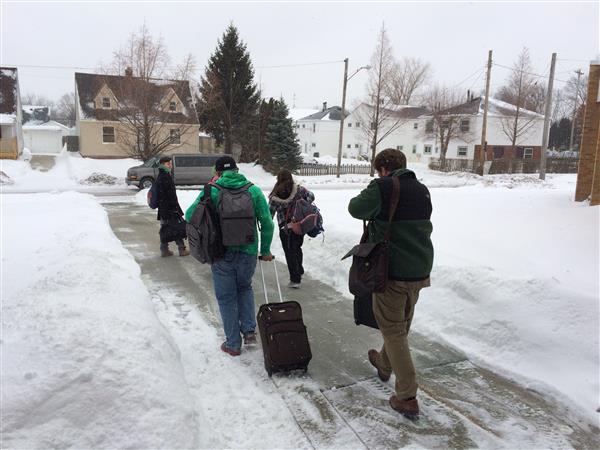
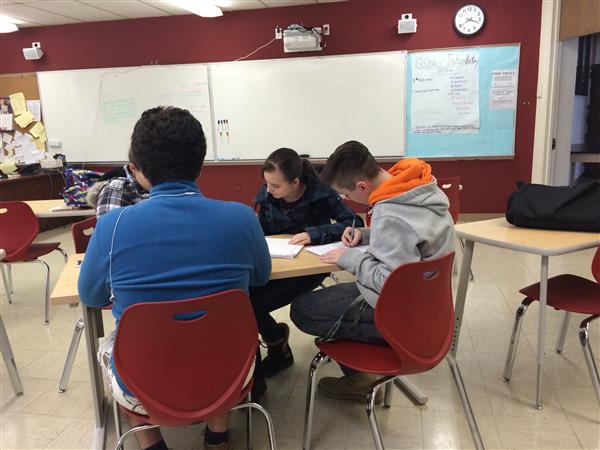
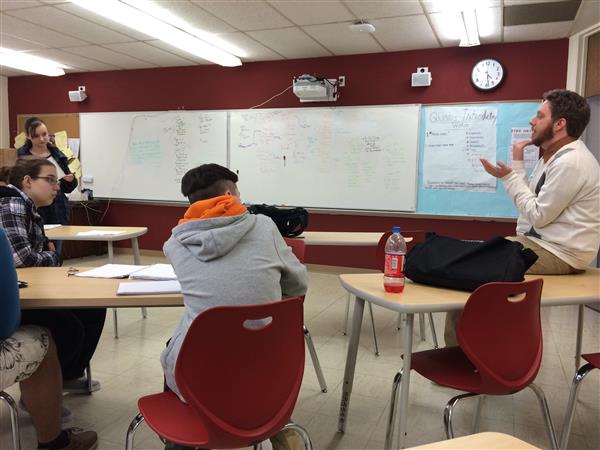
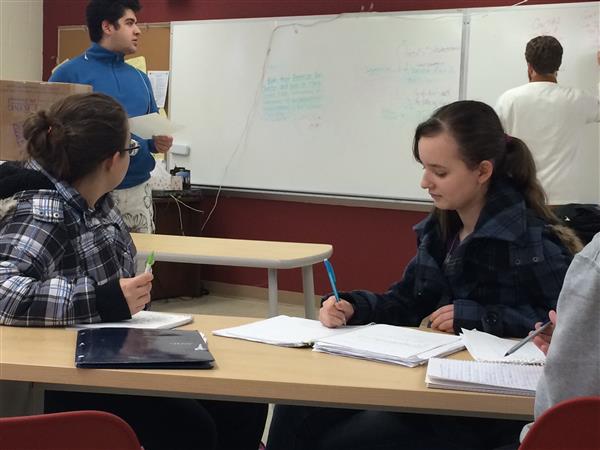
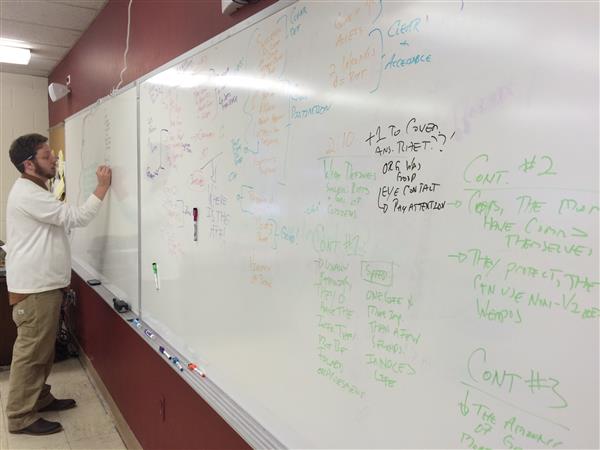
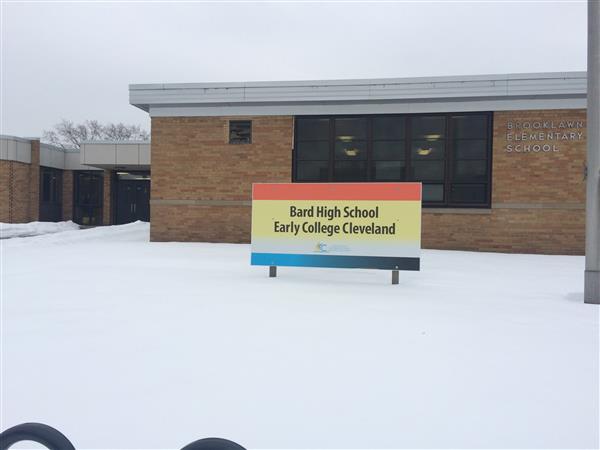
2/26/2015
The debate team is brand new to Cleveland’s Bard High School Early College, but then again – the school also is brand new.
Bard was one of four new CMSD high schools launched this school year. The others are the Cleveland High School for Digital Arts and two schools created to share John F. Kennedy (E³Agle Academy and PACT, the Problem-based Academy of Critital Thinking).
At a Bard team practice earlier this month, Risko alternated between openly encouraging his charges and slyly provoking them to think harder, deeper or more critically about the matter at hand: a debate over whether responding police officers should carry a firearm.
“In a policy debate, if you don’t answer – it becomes truth for your opponent and to the judges,” Risko said after a 90-second argument by one of his students. “Also, you’re reading your work instead of reaching your audience.”
Not Wynnter Millsaps: She was on a roll, establishing her argument against arming responding officers by raising her hands dramatically and staring right into the eyes of her audience.
Bard students to debate at N.Y. college (slideshow)








CMSD NEWS BUREAU
CMSD’s Bard High School Early College debate team hit the road early Thursday afternoon, heading east to New York to compete against other high schools at Bard's namesake college this weekend.
The six students and two teachers dodged snowflakes as they tossed their bags into a rented 15-passenger van that would take them on the eight-hour drive to Red Hook, N.Y. They'll compete in the debate tournament today (Friday, Feb. 27) at Bard College.
"I'm a little nervous because this is our first one," said sophomore Mel Pikakos as she and others stood outside the school office, most of the teens dressed in pajama pants or something equally comfortable for the long van ride. "But I think maybe it will be OK."
Fellow sophomore Dylan Somodji had a simple response to a teammate who noted that Somodji's entire book bag crinkled loudly when touched: "It's full of chips."
Debate coach and literature teacher Guy Risko smiled. "It's going to be a long ride, but it's also going to be a good trip," he said. "We're going to learn a lot."
New school, new idea
The debate team is brand new to Cleveland’s Bard High School Early College, but then again – the school also is brand new.
CMSD has several other debate teams. Lincoln-West has had a team for 10 years, said English teacher Carrie Cofer. There are also teams at SuccessTech Academy and John F. Kennedy High School, she said.
Risko, who started the Bard team earlier this year, competed in high school and college in Pennsylvania and later coached debate in graduate school.
“We’re excited for the experience in debating, but also to be at Bard with some of the other schools,” he said. "We've been told they'll put us all in a pool, so some of our kids will be competing with and against other (Bard) scholars."
Bard High School Early College is unusual in Ohio because of the way it blends high school and college curricula. Students can earn both their high school diploma and an associate’s degree from the college during their four-year high school career -- without ever leaving the school itself. Instead of having to attend a community college off site or take online courses, Bard students take classes that earn them both high school and college credits.
All the teachers at Bard High School Early College Cleveland are Bard faculty. The college operates three similar schools, but Cleveland's is the first outside the tri-state area of New York, New Jersey and Connecticut.
Risko said the critical thinking encouraged throughout the school made forming a debate team at Bard a natural choice -- or maybe not.
"I'm cautious a bit because of the academic rigor already emphasized here, and one our strengths is in our inquiry, in continually asking questions," Risko said.
"But with debate, you can get addicted to being right. In other words, debate incentivizes being right because you 'win,' but we also want to encourage being a lifelong learner and engaging in the 'next' question, so I'm a little ambivalent on what this will mean for us."
Practicing the debate
“In a policy debate, if you don’t answer – it becomes truth for your opponent and to the judges,” Risko said after a 90-second argument by one of his students. “Also, you’re reading your work instead of reaching your audience.”
Not Wynnter Millsaps: She was on a roll, establishing her argument against arming responding officers by raising her hands dramatically and staring right into the eyes of her audience.
“If he's protecting himself, he's not protecting the community and that -- THAT -- is his actual job," she said. "A patrolling officer does not need a firearm."
Risko said the debate teams that were to be at Bard College today would consider three issues: the arming of patrol officers, whether people should give up certain rights when those rights come in conflict with national security and whether homework should be banned.
"There ought to be some humor in that last one, any judge would expect to see that," he said. "But the first two are certainly serious topics."
He turned back to coaching his students: "That was a powerful pause," he said to Wynnter. "Debate is about communicating all the time -- not just in your words, but in your pauses, even in silence. You can win an argument in many different ways."

